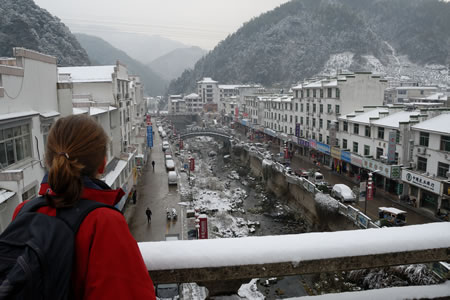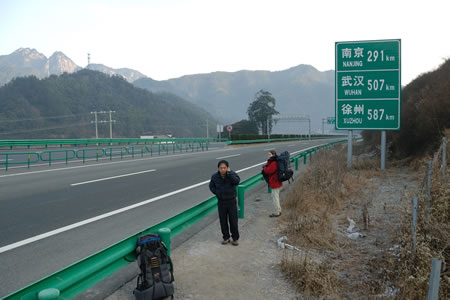English | Dutch |
|
| Getting used to the cold | |
Bangkok (Thailand) to Tunxi (China), Dec-15-09 / Dec-31-09 |
|
Finally, the third stage of our journey really took off. After our second visit home to family and friends in The Netherlands, and spending a week in Bangkok to arrange our Chinese visa, we hit the road again for the third phase of our journey. We are already two weeks in China and our first impression is great. The biggest change so far in comparison to last year, is undoubtedly the weather. We were used to temperatures of around thirty degrees Celsius in south-eastern Asia, while we have to do it in this part of China with temperatures that fluctuate around freezing point. That is a big difference; at least for us. We spend the first days of our first visit to China in Shanghai, the financial capital of this vast country. Despite the fact that Shanghai is huge (with a population of more than 20 million), the city is easy navigatable due to the extensive and efficient metro system. We got to know Shanghai as a friendly city and a perfect place to acclimatise to the new environment. However, the cold in combination with the wind makes December not the best time to visit the city. So, once in a while we had to escape to a McDonalds or other places were they serve hot drinks to warm our hands and toes (see also the article: Our first acquaintance with China: Shanghai). After a visit of four days to Shanghai, we packed our backpacks again and took the bus to Hángzhōu. A city recommended by several Chinese people that we spoke in Shanghai. It is seen by the Chinese as the most romantic city of the country. A place for us! |
|
 |
|
View on icy cold Tāngkŏu |
|
| The bus journey from Shanghai to Hángzhōu took us over a perfect highway. Along the whole stretch of almost two hundred kilometres, the Chinese are building a high speed train connection, which is constructed on poles, elevated from the ground. It is impressive to see how the Chinese deal with these kinds of mega constructions, when you consider the number of people involved and the construction tools they use. It is a typical example of action in stead of talking. We wouldn’t be surprised if they can complete these kinds of mega projects in less than half of the time that it would take in the west. After a comfortable journey of two-and-a-half hours, we arrive at the eastern bus station of the provincial city of Hángzhōu; with still more than six million inhabitants. This is for us the first time that we run into the fact that we don’t speak Chinese. In Shanghai that wasn’t really a problem, because English was relatively widely spoken, and many signs in public places were in both Chinese and English. But not here at the bus station of Hángzhōu. Fortunately, our guide book taught us that we have to take bus number 56 to the centre of the city. Besides that, we are also lucky that the Chinese mostly use the same characters for numbers, as we do in the west. That gave us the opportunity to stroll around the bus station in search of a bus stop where also bus line 56 stops. We eventually find the bus stop, and with use of the position of the sun to determine what is east and what is west, we choose the bus stop on the right side of the road. After a couple of minutes the bus arrived, and after we got in, we tried to explain to the bus driver that we wanted to buy two bus tickets to the centre of the city. But as expected: his English was as good as our Chinese. None at all. After looking at each other for a couple of seconds we decided to walk to some available seats in the bus. It seemed that the bus driver was also happy that we proceeded, because he didn’t undertake any actions to sell us two tickets. For the first time during our journey we took a ride without having a ticket.
Inside the bus we find a schedule of the route, but as expected: also only available in Chinese. We look in our guide book to see what Chinese characters are used to write the name of the street where we want to get off, and after some puzzling we find the same characters in the schedule of the bus route. Eventually we exit the bus on the right spot in the centre of the city. We walked around a little bit and after half an hour we found a small hotel near the main street of the city. We still had to get used to the hotel prices in China. In most cities of South-eastern Asia it is possible to find a decent room for around ten Euros a night, but here in China the prices are approximately twice of that. Hángzhōu is really a great city to spend some days and it is beautifully located around the historical West Lake. There are many hills around the lake where you can do some nice walking and the area around the lake is beautifully constructed. You can see that the city is a tourist attraction for many domestic tourists (see also the article: The Chinese town of love: Hángzhōu). | |
 |
|
Mr Hu arranged a bus; however, boarding along the highway |
|
After having a great time in the big cities of Shanghai and Hángzhōu, we decided to travel to a more rural area. We chose for two mountains areas: Huáng Shān and Jiŭhuá Shān, both located a three hours drive west of Hángzhōu. The first area we did visit is Huáng Shān. This spectacular mountain area of granite peaks with beautiful pine trees is considered to be one of the most beautiful mountain areas in the country. It didn’t take a lot of effort, due to the fact that the girl behind the counter of the bus station spoke English well, to buy the bus tickets to the small town of Tāngkŏu, located at the base of the Huáng Shān Mountains. When we arrived, we realized that the temperature in Shanghai and Hángzhōu weren’t that bad. Tāngkŏu is much colder due to the fact that it is located on a higher altitude. We checked in, in a small hotel and the owners told us that the room is equipped with heating; at least that is what we understood. And they didn’t lie. But what they didn’t tell us is that the air conditioner of the type ‘made in China’ only had enough capacity to heat the room till a temperature of around five degrees Celsius. But that is still higher than the temperature in the restaurants of Tāngkŏu. They don’t heat at all, which means that you eat your meal at around freezing point. On the day we arrived in the town, it snowed and we weren’t sure if it meant that we had to cancel our plans to go into the mountains on the following day. But when we looked at a clear starry sky early on the next morning, we knew that it would be a perfect sunny day. And that is what we got (see also our photo impression about Huáng Shān). The day after our impressive visit to Huáng Shān, Mr Hu who seems to us to be the only English speaking person in Tāngkŏu, got us on a bus to our following destination: Jiŭhuá Shān, one of the four holy Buddhist Mountains in China. He instructed the bus driver about where he should kick us out of his bus. Mr Hu arranged a pickup for us by a friend of him, who eventually seemed to be a female friend. Nothing comes for free of course. The friend of Mr Hu runs a small hotel in Jiŭhuá Shān and is keen on having us as her guests. The bus driver droped us in the town of Qingyang, where indeed the friend of Mr Hu was waiting for us to escort us to the Jiŭhuá Shān area, half an hour by bus away. The women is basically nice, but she had the annoying habit that she was a little bit too lively and spoke constantly Chinese to us, even after we told her several times that we didn’t understand any of it. But is seemed that it didn’t care to her, because she tootled whole day long. Despite the fact that the room of her hotel was again cold, her restaurant even colder and her Chinese talking annoying, we had a fabulous day on the mountain. We managed to complete the pilgrimage journey, which took us over beautiful mountains steps to the holy temple of Tiantai, perched high on a mountain top (see also the photo impression about Jiuha Shan). We are at the moment in the small town of Tunxi, waiting for the New Year to come. We still have to wait several hours before we enter the year 2010, but we are not sure if we are going to make it awake till twelve o’clock because also this room is not very warm. We probably opt for our warm sleeping bags and will wake up again in the New Year. It will also become 2010 without us!
|
|
| <Previous weblog> | |